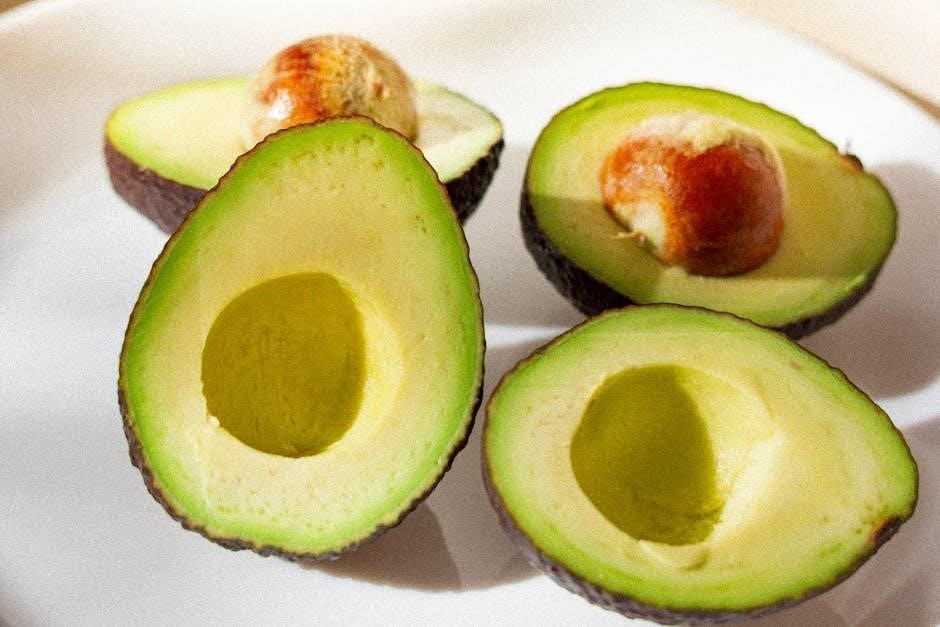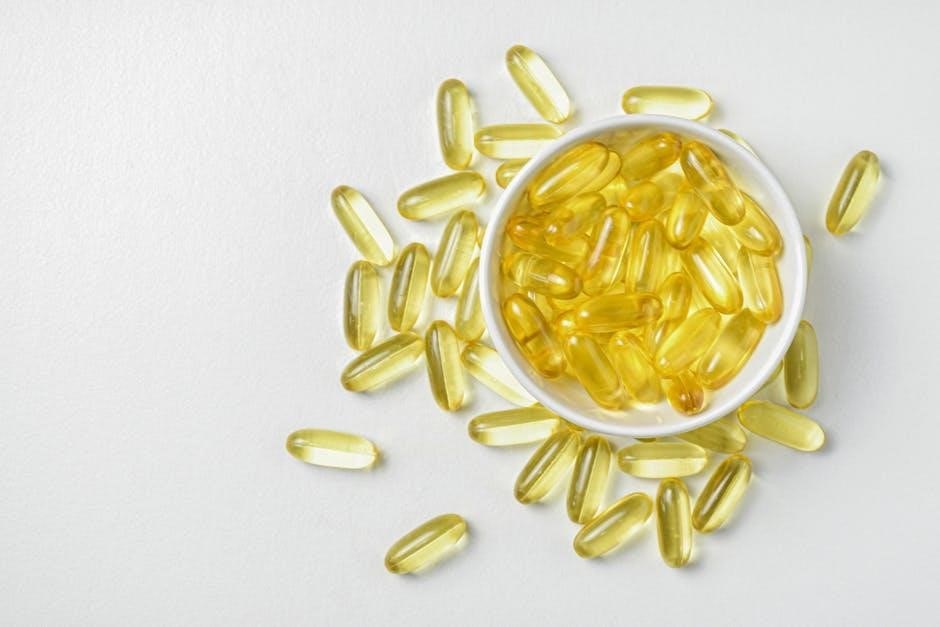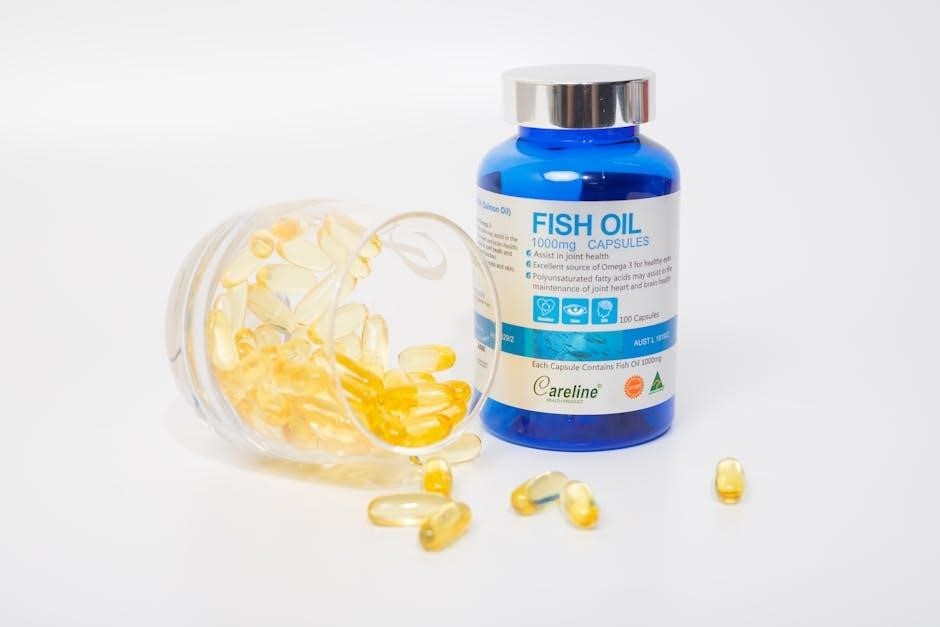fatty liver diet pdf

Fatty liver disease, often linked to metabolic syndrome, is increasingly prevalent. An unhealthy diet high in processed foods and sugars exacerbates the condition, making dietary changes crucial for reversal.
1.1 Understanding Non-Alcoholic Fatty Liver Disease (NAFLD)
Non-Alcoholic Fatty Liver Disease (NAFLD) is a condition characterized by excessive fat accumulation in the liver of individuals who consume little to no alcohol. It is closely linked to metabolic syndrome, obesity, and insulin resistance. NAFLD can progress from simple steatosis to more severe forms like steatohepatitis, fibrosis, and cirrhosis. Diet and lifestyle play a significant role in its development and management. Being overweight and consuming high-sugar, high-saturated-fat diets are key risk factors. Early intervention through dietary changes can help reverse the condition and improve liver health. Understanding NAFLD is crucial for implementing effective lifestyle modifications.
1.2 The Role of Diet in Managing and Reversing Fatty Liver
Diet plays a cornerstone role in managing and reversing fatty liver disease. Reducing saturated fats, avoiding added sugars, and adopting a balanced eating plan can significantly improve liver health. Studies show that dietary modifications, such as embracing the Mediterranean diet, help reduce liver fat and inflammation. Weight control is also critical, as excess body fat exacerbates NAFLD. A structured diet not only addresses liver health but also supports overall metabolic well-being, making it a powerful tool in reversing fatty liver disease and preventing its progression.

Key Dietary Approaches for Fatty Liver
The Mediterranean diet, rich in healthy fats, and avoiding the Western diet, high in processed foods, are key strategies to manage fatty liver effectively and promote liver health.
2.1 Mediterranean Diet: Benefits and Key Components

The Mediterranean diet emphasizes whole grains, fruits, vegetables, lean proteins, and healthy fats like those from avocados, nuts, and olive oil. It limits red meat and processed foods, reducing inflammation and fat accumulation in the liver. High in antioxidants and fiber, this diet supports weight management and improves insulin sensitivity, crucial for reversing fatty liver. Studies show its effectiveness in reducing liver fat and promoting overall metabolic health, making it a sustainable choice for managing NAFLD.
2.2 Western Diet: What to Avoid and Why
The Western diet, high in processed foods, added sugars, and saturated fats, contributes to fatty liver disease by promoting fat accumulation and inflammation in the liver. Foods like sugary snacks, refined carbohydrates, and red meat should be avoided as they exacerbate insulin resistance and metabolic syndrome. Limiting these foods reduces the risk of NAFLD and supports liver health. A shift away from this diet is essential for managing fatty liver effectively and preventing further liver damage.
Foods to Avoid in a Fatty Liver Diet
Processed foods, sugary snacks, and saturated fats worsen fatty liver by promoting fat accumulation and inflammation. Limiting these foods aids in reversing liver damage and improving health.

3.1 Processed Foods, Sugary Snacks, and Saturated Fats
Processed foods, sugary snacks, and saturated fats are key contributors to fatty liver disease. These items promote fat accumulation and inflammation in the liver. Sugary snacks cause insulin resistance, worsening NAFLD. Saturated fats, particularly from red meat and dairy, should be reduced. Refined carbohydrates, like white bread and pastries, also spike blood sugar and fat storage. Avoiding these foods is essential for liver health. Opt for whole, nutrient-dense foods instead to prevent further liver damage and support recovery. Reading nutrition labels helps identify hidden sugars and unhealthy fats in seemingly harmless products.
3.2 Hidden Sources of Added Sugars and Their Impact
Added sugars are often concealed in foods like ketchup, bread, and pasta sauces, making them tricky to identify. These sugars contribute to fat accumulation in the liver, worsening NAFLD. Consuming high-sugar foods promotes insulin resistance and inflammation, exacerbating liver damage. Even seemingly healthy options, like flavored yogurts or energy bars, can contain excessive sugar. Reading nutrition labels is crucial to avoid these hidden sources. Reducing sugar intake helps lower liver fat and improve overall health, making it a key step in managing fatty liver disease effectively.

Essential Foods for a Healthy Liver
A healthy liver diet includes fiber-rich foods, lean proteins, and healthy fats. Focus on vegetables, whole grains, plant-based proteins, avocados, nuts, and olive oil to improve liver health.
4.1 Lean Proteins: Plant-Based and Animal Sources
Lean proteins are essential for liver health. Plant-based options like beans, lentils, and tofu are rich in nutrients without excess fat. Animal sources such as poultry and fish provide omega-3 fatty acids, which reduce inflammation. Opting for low-fat dairy and egg whites further supports a balanced diet. These proteins aid in weight management and improve metabolic function, crucial for reversing fatty liver. Incorporate a variety of these sources to ensure adequate nutrition without overloading on saturated fats, promoting a healthier liver and overall well-being.
4.2 Fiber-Rich Foods: Fruits, Vegetables, and Whole Grains
Fiber-rich foods, such as fruits, vegetables, and whole grains, play a vital role in managing fatty liver disease. They improve digestion, regulate blood sugar, and promote satiety, reducing overall fat accumulation. Berries, leafy greens, and cruciferous vegetables like broccoli are particularly beneficial. Whole grains like oats, quinoa, and brown rice provide sustained energy without spiking insulin levels. A diet high in fiber helps reduce liver inflammation and supports weight management, which are critical for reversing fatty liver. Incorporating a variety of these foods ensures a balanced intake of essential nutrients, aiding in liver repair and overall metabolic health.
4.3 Healthy Fats: Avocados, Nuts, and Olive Oil
Healthy fats, including avocados, nuts, and olive oil, are essential for a fatty liver diet. These fats improve cholesterol levels, reduce inflammation, and aid in nutrient absorption. Avocados provide monounsaturated fats that support liver health, while nuts like almonds and walnuts supply omega-3 fatty acids. Olive oil, rich in antioxidants, helps protect the liver from oxidative damage. Incorporating these fats in moderation can enhance meal satisfaction and provide sustained energy, supporting a balanced diet that promotes liver repair and overall well-being. They are a key component in managing fatty liver disease effectively.

Additional Tips for a Fatty Liver Diet
Stay hydrated with water and herbal teas, plan balanced meals, and avoid processed foods. These habits support liver health and overall well-being effectively.
5.1 Hydration: The Role of Water and Herbal Teas
Hydration is vital for liver function, aiding detoxification and fat metabolism. Water flushes toxins, while herbal teas like green tea and dandelion tea enhance liver health; Drinking enough fluids can reduce liver inflammation and support weight management, key in fatty liver reversal. Aim for at least eight glasses daily, incorporating herbal options to diversify benefits without added sugars. Proper hydration combined with a balanced diet creates an optimal environment for liver recovery and overall well-being.
5.2 Meal Planning and Portion Control
Meal planning is essential for managing fatty liver disease, ensuring balanced nutrition and portion control. Organizing meals helps avoid impulsive unhealthy choices. Portion control prevents overeating, which contributes to weight gain and liver fat accumulation. Structured meal plans promote consistency, making it easier to adhere to dietary recommendations. Focus on reduced-fat meals, avoid processed foods, and limit sugary snacks. This approach supports weight management and improves liver health. Regularly tracking portions ensures long-term success, helping to reverse fatty liver disease effectively.

Monitoring Progress and Maintaining Lifestyle Changes
Regular monitoring of weight and liver health markers, such as ALT and AST levels, is crucial. Maintaining a healthy weight through consistent dietary changes prevents relapse. Staying motivated by tracking progress and celebrating small victories helps sustain lifestyle modifications. Avoiding tempting foods and staying hydrated are key to long-term success. Monitoring progress ensures continued improvement and motivates adherence to the fatty liver diet.
6.1 Tracking Weight and Liver Health Markers
Monitoring weight and liver health markers, such as ALT and AST levels, is essential for assessing progress. Regular blood tests help track liver inflammation and damage reduction. Weight management is also critical, as excess weight exacerbates fatty liver disease. By maintaining a healthy weight and improving liver markers, individuals can gauge the effectiveness of their dietary changes. This data encourages continued adherence to the fatty liver diet and lifestyle modifications, ensuring long-term liver health and overall well-being. Consistent monitoring provides actionable insights, helping individuals stay motivated and committed to their health goals.
6.2 Staying Motivated and Avoiding Relapse
Staying motivated is key to maintaining lifestyle changes for fatty liver management. Setting realistic goals and celebrating milestones helps maintain enthusiasm. Surrounding yourself with supportive family and friends can provide encouragement. Mindset plays a crucial role; view dietary changes as a long-term investment in health, not a temporary restriction. Avoiding relapse requires consistency and self-compassion. Small setbacks should not discourage long-term progress. Engaging in regular physical activity and practicing stress management techniques can further bolster motivation. Remember, reversing fatty liver disease is a journey, and consistent effort leads to lasting benefits for overall health and well-being.